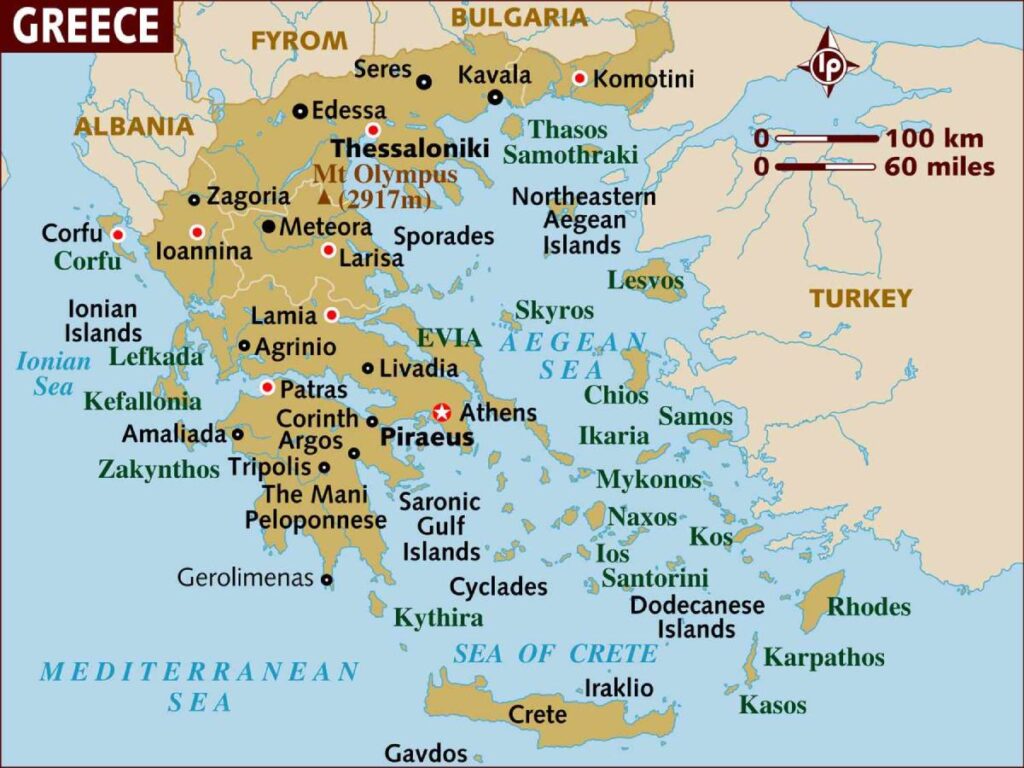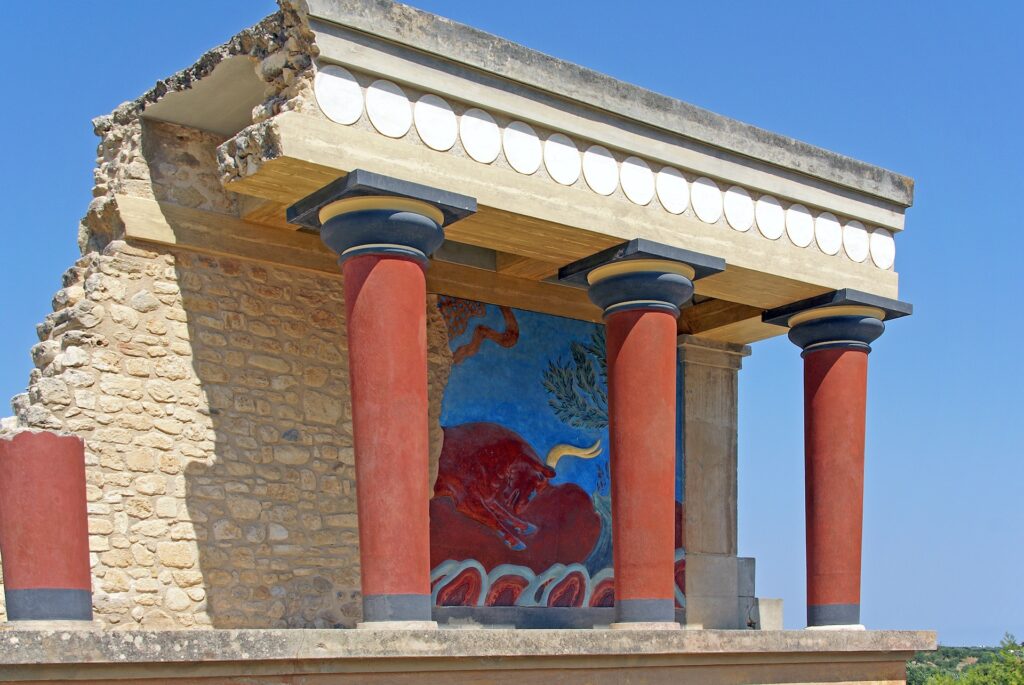Greece Travel Guide
Visit Greece safely and without any setbacks! Find where to go, travel restrictions, and what you need in this travel guide to Greece.
Not sure how to plan out your trip to Greece? This is the perfect post for you. Whether you’re seeking ancient ruins, pristine beaches, or vibrant culture, Greece has it all. In this comprehensive travel guide, we’ll dive into the top Greece details, recommend must-visit Greek islands, provide budget-friendly tips, show you how to stay connected, and give you the essential knowledge for a remarkable journey to this Mediterranean gem.

Where is Greece?
Greece is a mesmerizing country in southeastern Europe, located on the Balkan Peninsula. Its fascinating location places it in the Eastern European Time Zone, so make sure to adjust your watches accordingly. Greece boasts a Mediterranean climate, meaning warm, sunny summers and mild, wet winters. And let’s not forget about the delicious Greek cuisine, featuring gyros, moussaka, and baklava. Take a look at the nation’s map, locate yourself and think about the cities and towns you want to visit while you’re there!

Why travel to Greece?
Greece is a treasure trove of beauty, history, and culture. From the iconic white-colored houses of Santorini to the ancient ruins of Athens, every corner of Greece is worthy of exploration. Its rich history, with archaeological sites and temples, provides a unique perspective on the past. The culture is equally captivating, with lively festivals and a passion for music and dance. And don’t even get us started on the pristine beaches that line the crystal-clear waters of the Aegean and Ionian Seas.
When to Travel to Greece
The best time to visit Greece depends on your preferences. If you’re a sun-seeker and love the bustling atmosphere, summer (June to August) is ideal. For milder weather and fewer crowds, consider the shoulder seasons of spring (April to May) and autumn (September to October). Winter (November to March) is quieter but still offers some pleasant days for exploring. Check out festivals and events that you can experience in 2024. Keep in mind that the majority of the dates for next year’s events are approximations; the actual dates are to be determined.
- Mid-January–March: Carnival season (Apokreo), famous in Patra; peaks on the last Sunday before Lent.
- June–August: Athens & Epidavros Festival (music, opera, dance, and theater at the Odeon of Herodes Atticus beneath the Acropolis in Athens; drama and music at the Theater of Epidavros; some events now also held in January)
- June 15–22: Miaoulia Festival, Hydra (naval festival, fireworks)
- July 6–14: Nafplio Festival (classical music)
- July–August: Olympus Festival (music, dance, and theater at the site of the ancient Olympics)
- August: International Andros Festival (theater and music performances)
- August 2–5: Pulsar Festival, Samothrace (electronic music)
- August 9–17: Molyvos International Music Festival (classical music)
- September 5–9: Armata Festival, Spetses (reenacted naval battle and fireworks on last day)
- September 25–October 6: Athens International Film Festival
- November 9–10: Athens Marathon
Where to Travel in Greece
Athens:
Athens, the capital of Greece, is a historic and vibrant city known for its rich history, ancient landmarks like the Acropolis, and a lively contemporary scene. Visitors can explore the city’s archaeological sites and museums and enjoy Greek cuisine in the bustling Plaka district.
How to Get There:
Athens has a major international airport, Eleftherios Venizelos International Airport, making it easily accessible from around the world. Once in the city, public transportation, taxis, and car rentals are available for getting around.
Cost:
Accommodation in Athens can range from budget hostels to luxury hotels. Dining in local taverns and street food stalls can be affordable, but upscale restaurants may be pricier. Entry to archaeological sites and museums typically has an admission fee.
- Accommodation: Budget hotels and hostels may cost around $40–100 per night, while mid-range options can range from $100–200 or more. Luxury hotels can exceed $200 per night.
- Meals: Dining at local taverns and casual restaurants can cost roughly $10–30 per meal. Fine dining may cost $50 or more.
- Activities: Admission to the Acropolis, including other archaeological sites and museums, can be around $20–30.
- Transportation: Public transportation is affordable, with a single metro ticket costing around $1.50.
Tips:
- 1. Visit the Acropolis early in the day to avoid crowds and heat.
- 2. Explore the charming neighborhoods of Plaka and Monastiraki.
- 3. Try traditional Greek dishes like moussaka, souvlaki, and baklava.
- 4. Use the Athens Metro for convenient and affordable transportation.
Santorini:
Santorini, a stunning Greek island in the Cyclades, is renowned for its picturesque structures, breathtaking sunsets, and crystal-clear waters. It’s a popular destination for honeymooners, romantic getaways, and those wishing to get married in Greece.

How to Get There:
Direct flights from Athens and other significant European cities can take you to Santorini. Ferries from Athens and nearby islands are another option. On the island, buses, rental cars, and scooters are common modes of transport.
Cost:
Accommodation costs can vary widely, with luxury hotels overlooking the caldera being more expensive. Dining options are diverse, with both affordable local and high-end restaurants. Activities like boat tours and wine tastings can add to the overall cost.
- Accommodation: Budget accommodations may start at $80-150 per night, mid-range hotels around $150-400, and luxury options can be well over $400 per night.
- Meals: Dining at local restaurants could range from $15 to $40 per meal, while upscale dining can go beyond $50 per person.
- Activities: Excursions, boat tours, and wine tastings can cost around $50–100 or more per activity.
- Transportation: Taxis and rental cars may be more expensive, with taxi fares starting around $15–20 for short rides.
Tips:
- 1. Book accommodation well in advance, especially if you want a VIP view.
- 2. Visit the towns of Oia and Fira for incredible sunset views.
- 3. Explore the unique black-sand beaches on the island.
- 4. Try the local wine and traditional Greek dishes like seafood and Greek salad.
Crete:
Crete, the largest and one of the best Greek islands to visit, offers a mix of stunning beaches, extreme sports, and picturesque villages. It’s known for its diverse landscapes, including the White Mountains and the Palace of Knossos, a significant archaeological site.

How to Get There:
Direct flights from Heraklion or Chania, both of which have international airports, can take you to Crete. Ferries from Athens and other Greek islands are also available for those who prefer sea travel. Public buses and rental cars are common for exploring the island.
Cost:
Crete offers a wide range of accommodation options, from budget hotels to luxury resorts. Dining is reasonably priced, with local taverns serving Cretan specialties. Entrance fees to archaeological sites and museums may apply.
- Accommodation: Budget hotels and guesthouses can be around $40–100 per night; mid-range accommodations might cost $100–200; and luxury options can exceed $200 per night.
- Meals: Dining in local taverns may cost $15–30 per meal, while upscale restaurants can charge $40 or more per person.
- Activities: Entrance fees to archaeological sites are generally around $10–15.
- Transportation: Rental cars are commonly used for exploring Crete and may cost $30–50 per day.
Tips:
- 1. Explore the historic ruins of Knossos and Phaistos.
- 2. Visit the picturesque town of Chania or the vibrant city of Heraklion.
- 3. Sample Cretan cuisine, including dishes like dakos and lamb with stamnagathi.
- 4. Enjoy the island’s beautiful beaches, especially Elafonissi and Balos.
Are there travel restrictions in Greece?
Currently, there are no travel restrictions in Greece. However, in temples and historic sites, there may be limitations on where you can enter and explore. For any additional information, check the official Greek government website or your local embassy for the latest updates.
Greek Words to Know When Traveling to Greece
Even though the language can be a barrier, it’s best to learn at least a few languages in the official language so that you can relate to the locals and create more memorable experiences. Basic phrases and sentences are the best options and show genuine interest and respect towards residents and their culture.
- – “Kalimera” (Good morning)
- – “Efharisto” (Thank you)
- – “Parakalo” (Please)
- – “Nai” (Yes)
- – “Ochi” (No)
Greece Travel Recommendations
Staying Safe
Overall, Greece is safe for travelers and visitors. However, be cautious of pickpockets in crowded areas, especially in Europe. Petty crimes are common, so be aware so you don’t fall into traps. If you see that someone “dropped”, don’t pick it up, or if someone gives you a free “bracelet”, don’t accept or pay. Keep your belongings secure. Keep important documents in a safe place; however, it’s best to avoid carrying them around. Make copies of your passport and other documents and leave the originals at the hotel where you’re staying.
Staying Connected
A crucial factor is to remain connected while you visit Greece. There are plenty of options, like a portable WiFi modem, roaming services, a local SIM and more. However, one of the best options is the eSIM. Holafly’s eSIM product for Greece is a fantastic option, offering the convenience of a digital SIM card. With Holafly’s eSIM, you can enjoy reliable data connectivity without the hassle of changing physical SIM cards.
All you need is a compatible phone that supports the digital SIM. Go to the official website, choose the option that best suits you and complete the payment. You’ll receive a QR code to activate the data plan and be ready to go. Some benefits are that you can purchase and install it, no matter where you are. Some international providers, like Holafly, offer unlimited data with data sharing and an app to monitor your consumption.
Packing Tips
When packing for Greece, essentials include comfortable walking shoes, lightweight clothing for summer, a swimsuit, and good sunscreen. Don’t forget a power adapter to charge your devices.
Greece is a captivating destination that seamlessly combines history, natural beauty, and vibrant culture. This Greece travel guide has equipped you with valuable information to make the most of your trip. From archaeological sites to stunning islands, Greece offers a diverse range of experiences. So pack your bags, immerse yourself in the culture, and get ready for an unforgettable journey. Ready to explore Greece? Get your eSIM today for hassle-free connectivity!
Frequently Asked Questions
Most travelers from North America and Europe can visit Greece for up to 90 days without a visa. However, visa requirements may vary based on your nationality and the purpose of your visit, so check with your local embassy for the latest information.
Greece boasts numerous archaeological sites, including the Acropolis in Athens, the Palace of Knossos in Crete, and the Temple of Apollo in Delphi.
It’s generally not recommended to drink tap water in Greece. Stick to bottled water to avoid any potential health issues.
The currency used in Greece is the euro (€). It’s recommended to exchange some money before leaving, just in case. Once you arrive, locate a bank or a local currency exchange office. Don’t exchange any money at the airport because they charge high commissions and the rate is not as favorable.














































 Pay
Pay  Language
Language  Currency
Currency 


















 No results found
No results found











